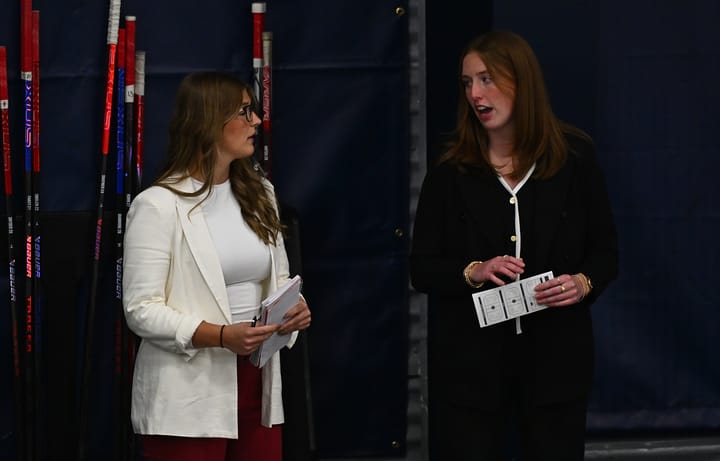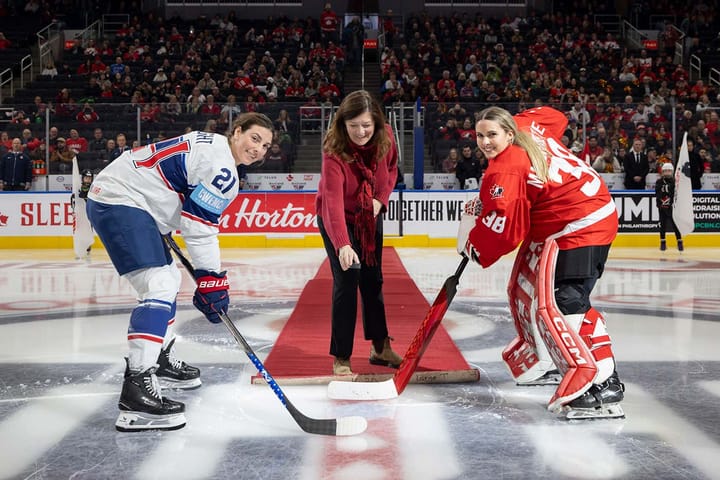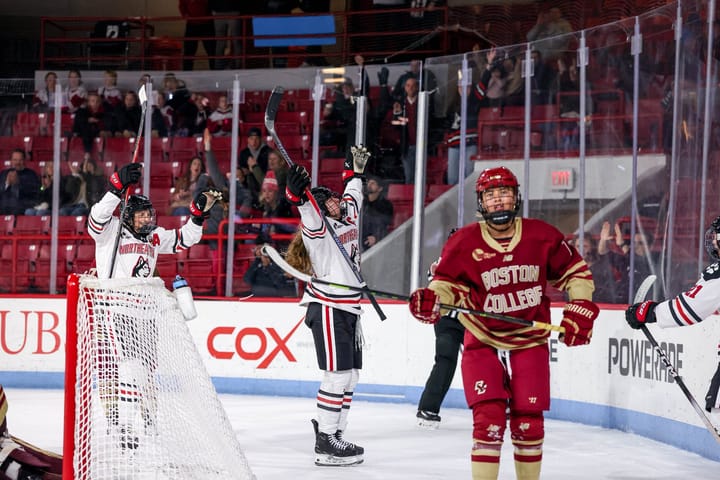Pandemic brings abrupt end to Tiley’s time in SDHL
The Canadian netminder was so close yet so far from a title with HV71.
Shea Tiley had always envisioned herself spending at least one season in Europe. That probably has a lot to do with her experience overseas with her father, Brad, who plied his trade in Germany and Austria with a 12-year-old Tiley in tow. What she didn’t known, though, was whether she wanted her go-round across the pond to be a full-campaign contract or something simpler. Thus, when the offer of a half-season pact came from the SDHL’s HV71, it was easier for Tiley to leap at the opportunity. All told, it took her five days to decide.
“There was maybe a tiny bit of hesitation at first, but overall I was pretty excited about the opportunity to live in a different country, play on a good team, play at a high level and be able to practice and work out every day,” Tiley, 23, said. “And it’s something I’ve wanted to do for a while, so having the opportunity was exciting.”
As much as it is about fulfilling a career goal, Tiley sees it as a chance to hone her craft. Amid the most turbulent time in the sport’s history, meaningful playing time has been hard for her to come by this season. The former Clarkson standout had performed admirably with the Toronto Furies during the 2018-19 campaign, but the abolition of the CWHL saw Tiley since land with the PWHPA. But her in-game ice time had, to this point, been limited. Sure, she stopped pucks in a couple showcases, but she wanted more reps. That’s what she’s getting in Sweden.
“It’s really important,” Tiley said. “I’m still vying for a spot on the national team and trying to work my way there. Being able to get in practices every day, work out every day, get in games a lot, too, in a short amount of time was a really big factor for me.”
And at the time of this conversation, Tiley is excelling. Through four regular season games, she was almost impenetrable, posting a .978 save percentage and 0.50 goals-against average. Her play has been equally as impressive, though somewhat less superhuman, though three post-season contests: she’s turned in a .934 SP and 1.33 GAA. In her last outing, she stopped 23 of the 25 shots that came her way, out-duelling Djurgardens’ Samantha Ridgewell to help HV71 punch their ticket to the SDHL final.
“We’re waiting for the finals,” she said. “They start on Wednesday.”
The date is March 6. Tiley does not know how much will change in one week.
• • •
When Tiley’s head hit the pillow the evening of March 11, she drifted off with visions of an SDHL crown. The Canadian netminder had celebrated HV71’s victory in Game 1 of the Swedish league’s final with her teammates and had inched that much closer to championship glory in what has been one of the most topsy-turvy years in the sport’s history. It wasn’t going to be a storybook ending, per se, but it was enough to provide Tiley a shot at a successful conclusion to a turbulent campaign.
But Tiley awoke to a different sporting landscape. Overnight, NBA player Rudy Gobert had tested positive for coronavirus, and while the spread of the global pandemic shuttered seasons in Switzerland, Germany and Slovakia, among others, his confirmed case was seemingly the death knell for on-ice action. “That’s when everything between the U.S. and Canada exploded,” Tiley said.
In the wake of Gobert’s test, the NBA pressed pause on its campaign. Soon after, the NWHL postponed its one-game final, the NHL suspended its season, and major junior, minor hockey and collegiate circuits throughout North America scrapped what was left of their schedules. Only a few defiant leagues throughout Europe, the SDHL among them, remained standing.
However, despite the league shifting the final to a best-of-three, despite the potential to play the games behind closed doors, despite this measure and despite that precaution, it seemed only a matter of time before the SDHL suffered the same fate. The writing on the wall was big and bold and in neon colors. But that didn’t stop Tiley and Co. from arriving at the rink in Luleå ahead of Friday’s Game 2 to participate in morning skate, to prepare for a potential title-winning contest, to get set for their most important game of the season.
And then came the call. Four hours before HV71 were set to square off, players and staff were told Game 2 – as well as Sunday’s if-necessary Game 3 – were off.
“We were getting ready for the game and then it was like, all of a sudden, there’s a lot of conflicting reports about why those two games were cancelled,” Tiley said. “It was really confusing and no one really had an answer, so that was the toughest part because there was no difference in playing those two games and then seeing where it was…We just needed one more win, because we had won on the Wednesday. It was a really weird situation, but the world was going crazy.”
• • •
Initially, Tiley wasn’t set to return to Canada until March 31. Coincidentally, that’s the same date she was allowed to end self-isolating after touching back down on Canadian soil two weeks earlier. That, in and of itself, was a strange experience. She had been away from home for months, only able to really speak with her family in the early hours when she could catch them on the phone, yet wasn’t able to reach out and touch those who she had longed to see since her departure.
“It was pretty tough,” Tiley said. “(My dad and grandparents) brought my car to the airport, left it running, I put my stuff in the back of the truck, they left and I got in my car and drove to my house. It was weird. I hadn’t seen them for about three months and I just had to wave to them. No hugs, no nothing.”
Now that her isolation has ended, she’s been reunited with family. Her dad, who had moved into her grandparents’ house down the street during Tiley’s two-week sequester, is back in the house, as is her brother. And during this all, Tiley is searching for the silver linings, wafer-thin as they might be. She lives in the country, so she can walk, she can run, she can stay active and in shape and prepared for whatever comes next. She’s also had the support of Hockey Canada in finding programs tailored to her, using the equipment she has available to ensure she remains capable of peak performance.
Before she had departed, too, Tiley felt that’s what she was getting close to playing at the very top of her game. She hadn’t made the cut for the Canadian women’s national team that was set to compete at the since-cancelled 2020 IIHF World Championship, but utilizing her time in Sweden, she felt she had rounded out aspects of her game that needed rounding. She was working on her post play, keeping her glove and blocker more active and improving her puck-handling.
But the unfortunate reality is that Tiley did not and will not get to reap any immediate rewards from her own improvement. She didn’t get to play out the final games of her campaign or see her abridged tenure in Sweden through to the end. She’ll never know if she would have won an SDHL championship or get to see if she could be the one to backstop HV71 to that title.
Unfortunate as that may be, though, Tiley is able to put it all into perspective.
“At the end of the day,” Tiley said, “they made the right choice. It’s bigger than hockey right now.”





Comments ()